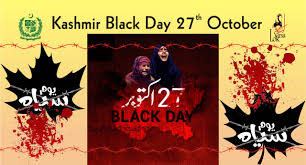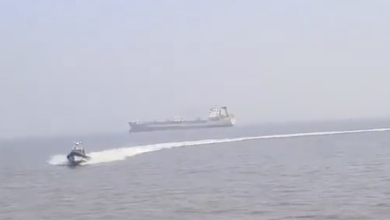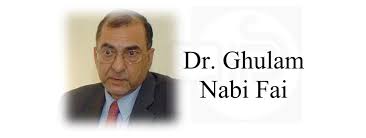
 Once, Kashmir was a land of stillness and beauty, where the mountains cradled the dreams of its people—a land where freedom was not just a hope but a way of life. But on a fateful morning of October 27, 1947, darkness descended upon this paradise. The calm valleys were shaken as Indian troops invaded, and the peaceful dreams of the Kashmiri people were shattered. What began as a desperate plea for protection by a confused ruler soon spiraled into a long, bloody conflict. The hope for freedom and self-determination was replaced by fear, oppression, and a bitter reality that has left generations of Kashmiris mourning the loss of not only their land but their future. 27 oct marks the beginning of an unending struggle, one that turned their paradise into a battlefield soaked in grief and injustice. It was on this day, following the controversial signing of the Instrument of Accession by Maharaja Hari Singh, that Indian troops were airlifted into Srinagar, an event which would set the stage for the long-standing conflict between India and Pakistan, with Kashmir at its center.
Once, Kashmir was a land of stillness and beauty, where the mountains cradled the dreams of its people—a land where freedom was not just a hope but a way of life. But on a fateful morning of October 27, 1947, darkness descended upon this paradise. The calm valleys were shaken as Indian troops invaded, and the peaceful dreams of the Kashmiri people were shattered. What began as a desperate plea for protection by a confused ruler soon spiraled into a long, bloody conflict. The hope for freedom and self-determination was replaced by fear, oppression, and a bitter reality that has left generations of Kashmiris mourning the loss of not only their land but their future. 27 oct marks the beginning of an unending struggle, one that turned their paradise into a battlefield soaked in grief and injustice. It was on this day, following the controversial signing of the Instrument of Accession by Maharaja Hari Singh, that Indian troops were airlifted into Srinagar, an event which would set the stage for the long-standing conflict between India and Pakistan, with Kashmir at its center.
Maharaja Hari Singh, the last Dogra ruler of Jammu and Kashmir, was caught in a dilemma during the partition of the subcontinent in 1947. As princely states were given the choice to accede either to India or Pakistan, Hari Singh hesitated. Despite the overwhelming Muslim majority in Kashmir favoring accession to Pakistan, the Maharaja sought to remain independent. This created a rift between the ruler and his people, particularly after the Muslim Conference, the largest political party in the region, passed a resolution on July 19, 1947, calling for Kashmir’s accession to Pakistan. The wishes of the Kashmiri people were thus clear, self-determination in line with their cultural and religious ties to Pakistan. In exchange for protection, the Maharaja signed the controversial Instrument of Accession on October 26, 1947, handing over control of defense, communications, and foreign affairs to India. This act, carried out without consulting the Kashmiri people, remains a matter of dispute to this day. Many scholars question the legality of the accession, particularly because the document has never been presented before the United Nations Security Council (UNSC), despite being the basis for India’s military presence in Kashmir. The signing of the Instrument of Accession is widely seen as a betrayal of the Kashmiri people’s aspirations, as it ignored their desire to join Pakistan.
Following the Indian military’s entry into Kashmir, the region was plunged into a state of turmoil. Pakistan and India soon found themselves at war over Kashmir, prompting India to take the matter to the United Nations in January 1948. In response, the UNSC passed several resolutions, most notably Resolution 47 of April 21, 1948, which called for a plebiscite to allow the people of Jammu and Kashmir to determine their own future. This resolution laid out a clear roadmap for resolving the conflict: India was to withdraw its troops and a plebiscite was to be held under UN supervision. However, despite these clear instructions from the international community, the plebiscite has never been conducted. India, after initially accepting the resolution, backtracked on its promises, declaring Kashmir an “integral part” of its territory. By refusing to hold the plebiscite, India denied Kashmiris their fundamental right to self-determination, a right enshrined in international law and reiterated by the UN numerous times. The aspirations of the Kashmiri people to decide their own political future were thus thwarted, and the region was plunged into a state of protracted conflict, militarization, and occupation.
As the situation in Kashmir escalated, the atrocities committed by Indian forces began to surface. The most horrifying of these was the Jammu Massacre, which occurred in October and November of 1947, just weeks after India’s intervention. Tens of thousands of Muslims were systematically slaughtered by Dogra forces, with the tacit support of Indian troops, as they attempted to flee to Pakistan. Estimates of the death toll range from 20,000 to over 100,000, and the massacre left a deep scar on the collective memory of the Kashmiri people. The Jammu Massacre is a dark chapter in the history of the Kashmir conflict, representing the violent and bloody consequences of India’s illegal occupation. It also symbolized the utter disregard for Kashmiri lives and their right to self-determination. This massacre further fueled the Kashmiri resistance and their demands for justice and accountability, demands that continue to be ignored by the Indian state.
Despite the international community’s early involvement in the Kashmir issue, the situation has deteriorated over the years. India’s refusal to comply with UN resolutions and its ongoing militarization of the region have led to widespread human rights abuses, including extrajudicial killings, enforced disappearances, and arbitrary detentions. The revocation of Jammu and Kashmir’s special status on August 5, 2019, further escalated the conflict, as India unilaterally stripped the region of its autonomy, imposed a communications blackout, and deployed additional troops.
The Kashmir conflict extends beyond India and Pakistan, posing a nuclear threat to the region. Despite India’s narrative of economic development, the reality includes illegal occupation, demographic changes, human rights abuses, and suppression of self-determination. UN resolutions remain unimplemented, and the Kashmiri people continue to suffer under military oppression. The international community’s silence and inaction have only emboldened India’s oppressive tactics. The cycle of violence, repression, and denial of fundamental rights continues, leaving Kashmiris in a state of perpetual suffering. The world must remember that the Kashmir issue is not just a regional conflict but a human rights crisis that demands immediate attention. October 27th reminds the world of the ongoing injustice and the urgent need for peace and accountability.
Writer is pursuing BS International Relations at National Defense University Islamabad and intern at Kashmir Institute of International Relations ( KIIR)








